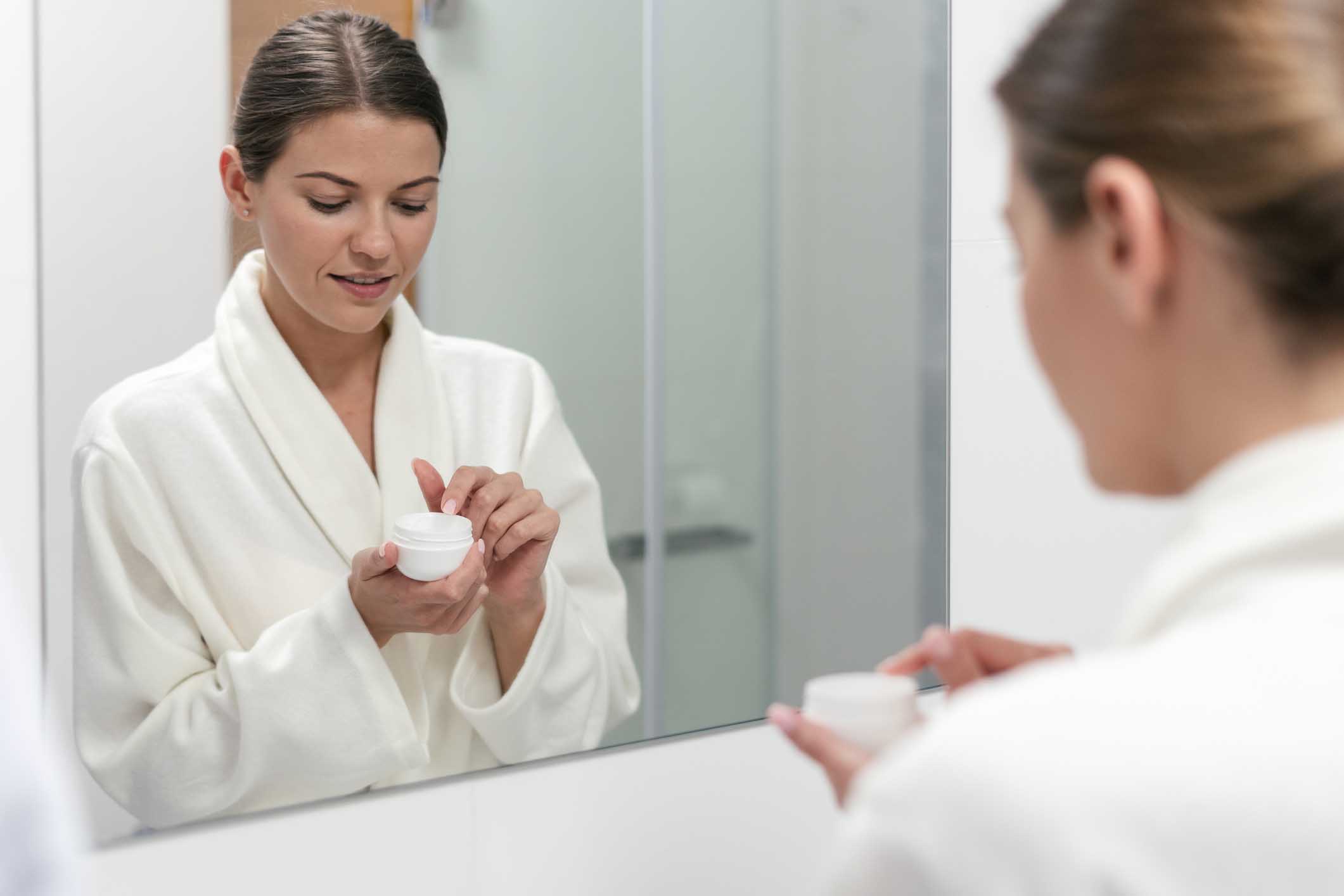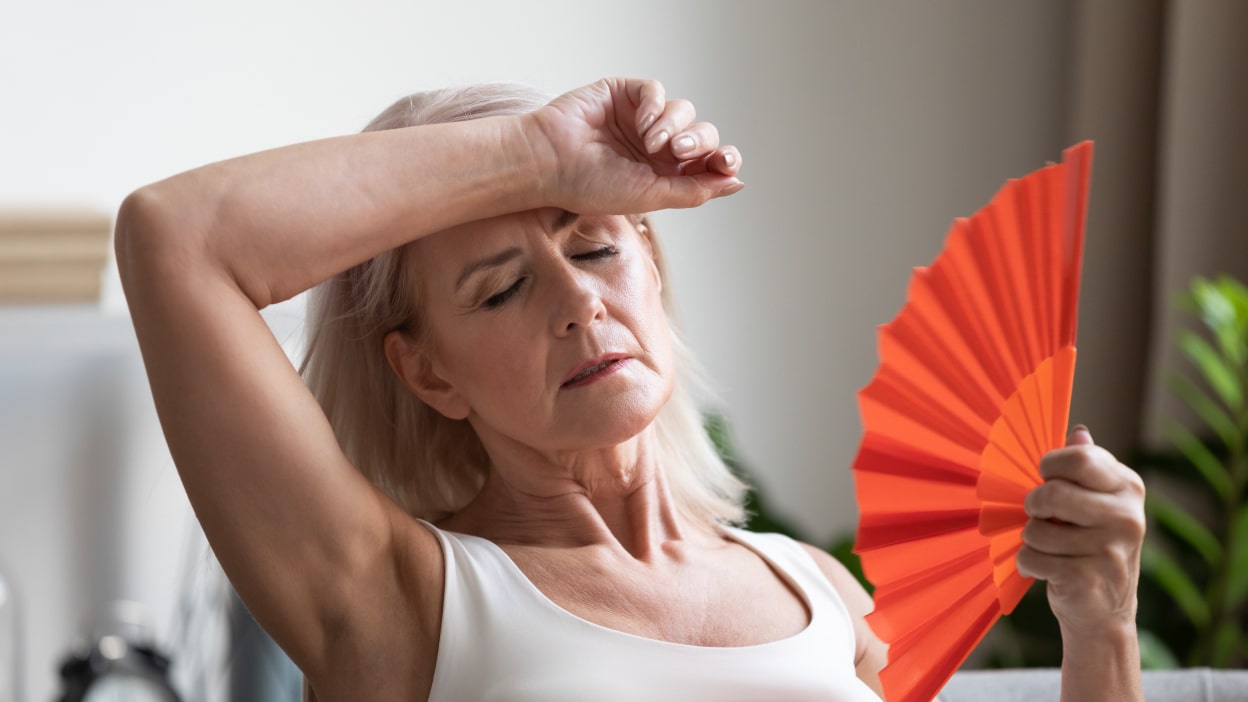How To Manage Oily Skin After Menopause
How To Manage Oily Skin After Menopause
My cosmetic bag was once filled with foundations for oily skin and all type of oil control skin care products. As we say in my native country, Venezuela, it looked like a pastelito bag, when a greasy fried empanada soaks its brown paper bag with oil.
That all changed when I started to experience menopause symptoms. Suddenly, my skin was flaky and irritated. Even my dermatologist said my skin was really dry and sensitive. I've always bought T-zone control creams. What was I going to do with all the oil control products? And more importantly, how was this even possible?
"Blame the hormones and the calendar," my dermatologist said. Many perimenopausal women (I belonged to this group in my mid-30s) experience some skin changes, such as age spots, wrinkles, itching, and, yes, even dry skin, faster than their peers. These changes often are associated with estrogen deprivation, which leads to decreased skin elasticity and blood supply, according to an article published in The Journal of the American Pharmacists Association.
Erin Palinski, R.D., CDE, LDN, CPT, author of the book Belly Fat Diet for Dummies, wrote "the reduction of estrogen causes the body to slow production of body oils, as well as reduces the body's ability to maintain moisture."
Kitchen Beauty Counter
Before running out to buy the latest $200 miracle moisturizer, first look in your kitchen. Feeding your skin certain foods that are rich in specific vitamins and minerals can keep your complexion glossy and healthy.
The same way that hundreds of crunches will do little to shred the extra pounds, slathering on expensive cream won't help if you fill you plate with simple carbohydrates and other foods that damage your skin tissue from within.
Plus, most of the food that can help bring your skin back to life will also help you fight other perimenopause and menopause symptoms, including hot flashes, vaginal dryness, and weight gain. They also support your aging heart and bones.
Here's a look a specific skin problems and how different foods can help heal and soothe from the inside out.
Skin-Food Solutions
Dry skin: Add some healthy mono-saturated fats and omega-3 fatty acids to your shopping list.
"Olive oil and avocado are superb sources of healthy monounsaturated fats. Not only do these good-for-you fats help strengthen and protect your skin's cell walls, but they help keep your skin lubricated, aiding in the prevention of dry flaky skin," says Corinne Dobbas, M.S., R.D.
Likewise, omega 3-fatty acids will protect the skin membranes and increase moisture to give you a plumper skin effect. To get these, eat more fatty fish likes salmon, herring and tuna, along with flaxseeds and walnuts.
Leslie Bauman, board-certified dermatologist and New York Times bestselling author (www.skintypesolutions.net), also recommends foods with linolic acid since low intake of this oil is linked to dry skin. Good sources include canola oil, soy food like tofu, and pumpkin and sesame seeds. You can even put it directly on your skin, using safflower oil or olive oil.
Avoid: foamy cleansers and bubble baths. The suds in the soaps actually pull fats out of your skin. Instead, use a milky cleanser, suggests Bauman.
Sensitive skin (with conditions like rosacea and acne): Since every woman experiences perimenopausal hormone fluctuations differently, some end up suffering from adult acne.
One of the best ways to fight acne is to eat more sources of Vitamin A, such as leafy greens, spinach, carrots, sweet potato, and turkey. This vitamin is a main ingredient in many acne medications. "Vitamin A is known for overall skin health and helps prevent overproduction of cells in the skin's outer layer, meaning less clogged pores and ultimately, blemishes," notes Dobbas.
Keep up your intake of omega 3 fatty acids intake, which can lower inflammation in your skin, adds Bauman.
Sometimes, it's not about what you should eat or avoid, but what you lack. Elissa Brenner, M.S. in nutrition therapy says, "A lot of acne sufferers actually have a zinc deficiency, which can control oil in the skin. Add more oysters, pumpkin seeds, ginger, pecan, oats and eggs to your diet."
Avoid: dairy and sugar for acne. For rosacea, stay away from cayenne pepper, curry, hot sauces, and alcohol.
Wrinkles: To prevent skin aging and sagging, nothing beats antioxidants like blueberries, pomegranates, acai berry, and raspberries, along with spices and herbs like curry, oregano and ginger.
Sweet potatoes, broccoli, pineapple, kale and peppers provide Vitamin C, which research shows promotes the growth of collagen a protein that smoothes out wrinkles and allows for a fuller, more youthful face, adds Dobbas.
Avoid: sun, smoking, processed foods, simple carbohydrates (white pasta and bread) and trans fats (processed and junk food). Once your collagen breaks down, you'll begin to develop wrinkles, aging and crepey skin.
Everyone wants to age well, and nothing contributes more to that than healthy skin. Feed your skin the right way and it can stay youthful for a long time. In a study where more than 4,000 middle-aged women were assessed on the relationship between aging and skin aging, those who had less protein, potassium, vitamin C, and Vitamin A in their diet had a more wrinkled appearance, says Martina M. Cartwright, Ph.D., R.D, adjunct faculty member at University of Arizona, in the IDEA Fitness Journal.
Here's my final advice for an instant, glowing face: aerobic exercise. It increases facial vascularization and oxygenation, which creates an unmistakable rosy luminance that influences perception of age, health, and attractiveness.
Food remedies by Elissa Brenner
a) Acne: Drink cucumber juice and/or apply thin slices of fresh cucumber for 15 minutes.
b) Dry skin: Separate an egg, beat the yolk, smooth onto your face, let the yolk harden, and splash off with water. Use eggs with extra omega 3 fatty acids
c) Aging skin: Wash a hand full of strawberries, smash with a mortar and pestle and then apply mixture to blemishes. Let dry for 20 minutes and rinse off.
d) Neck wrinkles: Dip a towel in warm olive oil, wrap around your neck and then wrap that with hot dry towel to steam away toxic waste and lock in moisture.
Homemade Gorgeous Skin Date Bars
Recipe by Lisa Roberts-Lehan, Certified Health and Nutritional Consultant, and Holistic Chef
16 medjool dates, pitted (or any kind of dates)
1/3 cup goji berries (or small-sized cranberries)
1/3 cup pumpkin seeds
1/3 cup sunflower seeds
3 tablespoons flaxmeal
? cup raw cocoa nibs or dark chocolate chips
Method:
1. Line a 9 x 9 inch straight-sided pan with parchment paper so the paper hangs over the long edges. Set aside.
2. Place the pumpkin and sunflower seeds in a food processor fitted with a metal blade. Pulse until they are uniformly chopped. Add the goji berries, flaxmeal, and chocolate and pulse again until finely chopped. Pour the mixture into a bowl and set aside.
4. Add the dates to the food processor and process until a paste forms. Add the mixture from the bowl. Process until evenly combined. Scrape into the prepared pan.
5. Press the mixture evenly over the bottom of the pan. Wet your hands and use them to make the mixture as smooth as possible. Fold the excess parchment to cover the mixture and refrigerate for at least 2 hours before slicing.
6. Transfer mixture from the pan to a cutting board. Cut into desired size and store in the refrigerator in a sealed container.
Yield: 20
Nutritional Information: Calories: 90, Fat: 2.3 g, Carbs: 18.3 g, Protein: 1.5 g
Recommended Products
Absorbency Level
Absorbency Level















